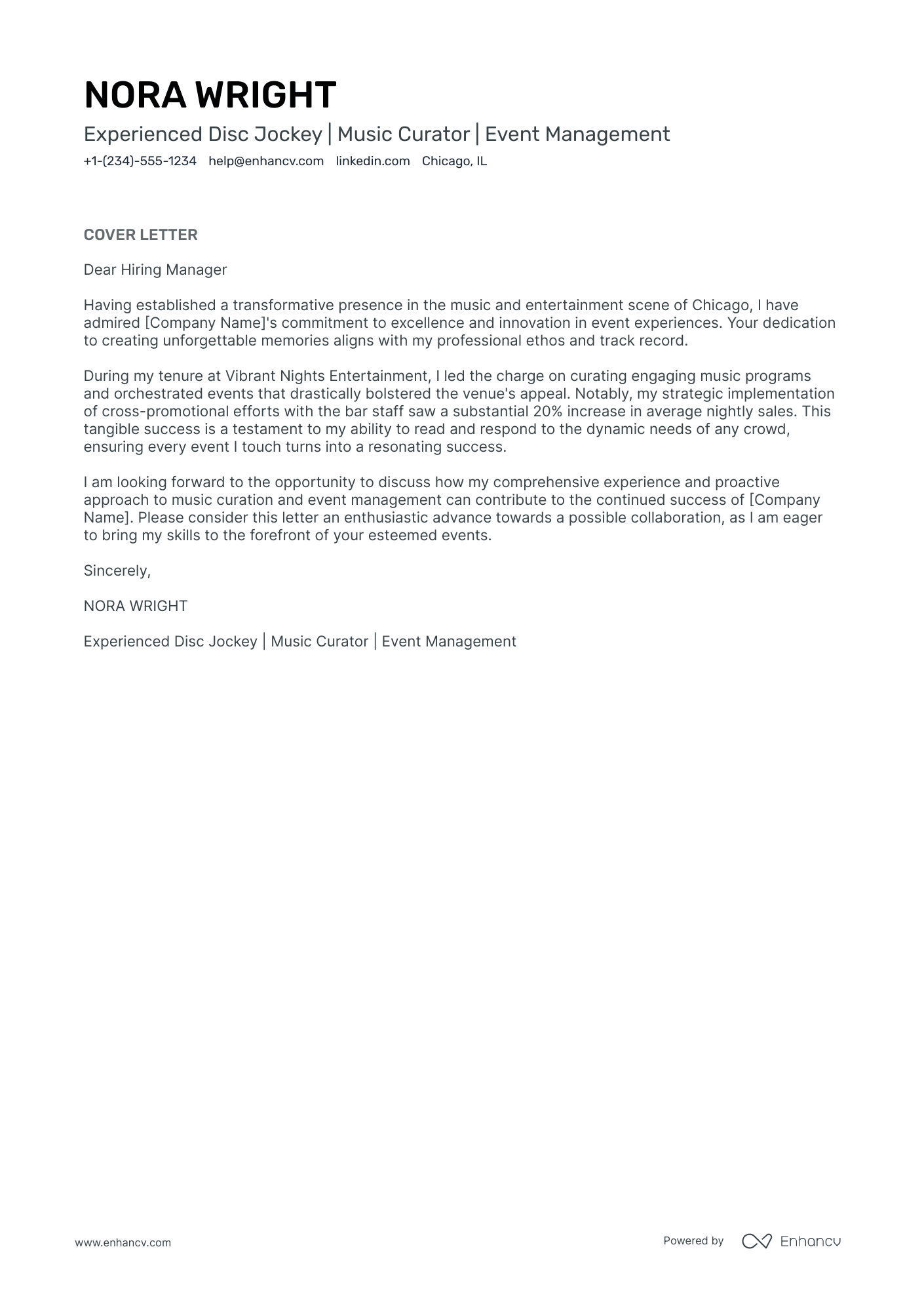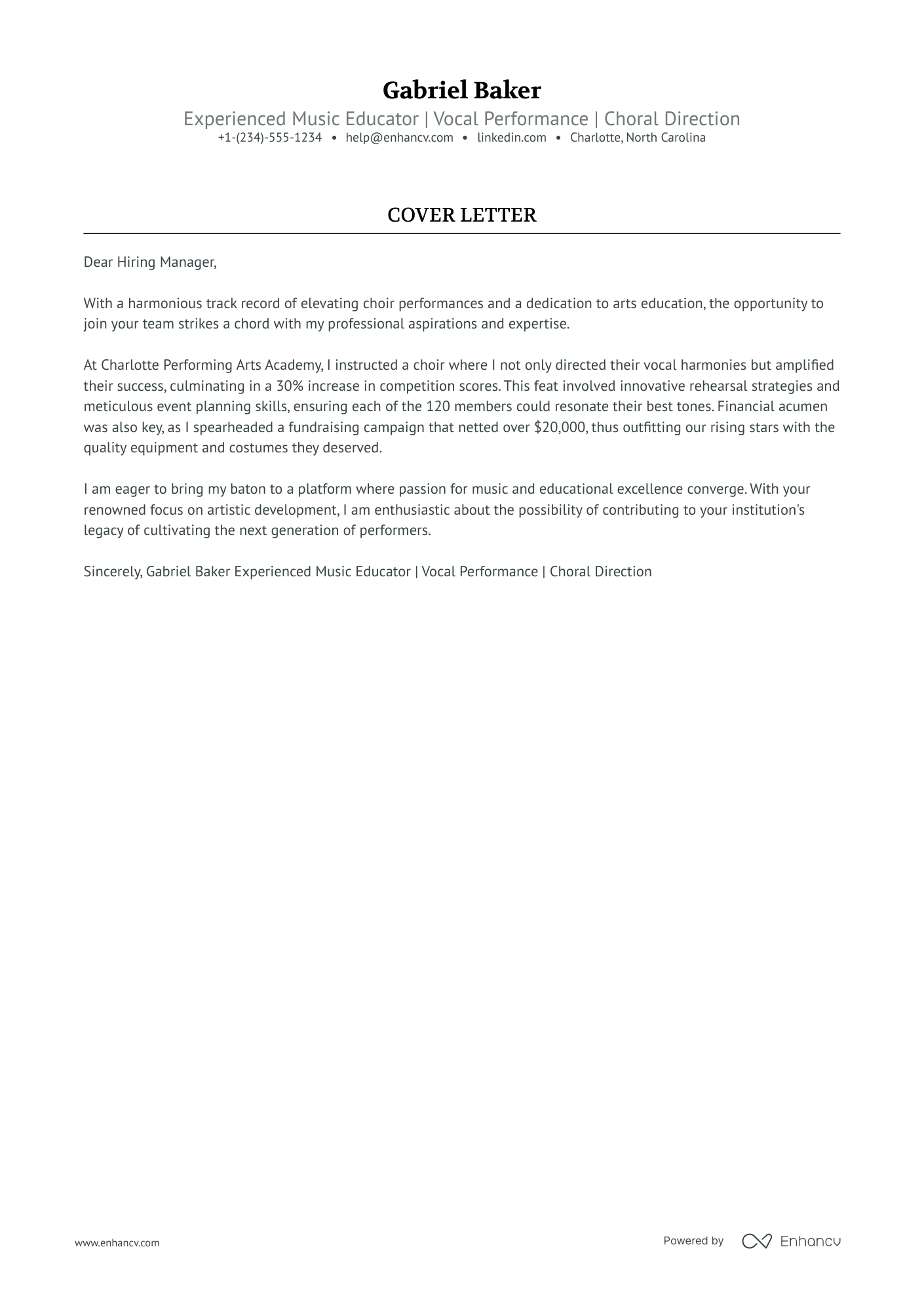Crafting a musician cover letter can strike a sour note if you're unsure where to start. You've fine-tuned your resume and you're ready to apply for that dream job, only to find that a compelling cover letter is required. Remember, it's your chance to showcase a crescendo of your career, not an echo of your resume. Maintain a formal yet fresh tone, steering clear of worn-out phrases, and encapsulate your finest musical moment within a single, striking page.
- Step your best foot forward in the musician cover letter introduction;
- Be inspired by other professionals' certified cover letters;
- Structure your musician cover letter to feature what matters most;
- Close off your musician cover letter to make a memorable impression on recruiters.
But where to start writing? Upload your resume into Enhancv's AI, which will prepare your musician cover letter (all you need to do is personalize it, and you'll be good to go).
If the musician isn't exactly the one you're looking for we have a plethora of cover letter examples for jobs like this one:
- Musician resume guide and example
- Writer cover letter example
- Cinematographer cover letter example
- Filmmaker cover letter example
- Commercial Actor cover letter example
- Wedding Photographer cover letter example
- Photographer cover letter example
- Model cover letter example
- Gallery Director cover letter example
- Background Actor cover letter example
- Voice Actor cover letter example
Drop your resume here or choose a file.
PDF & DOCX only. Max 2MB file size.
Musician cover letter example
Zoe Thompson
Los Angeles, California
+1-(234)-555-1234
help@enhancv.com
- Personalization and connection to the company's values demonstrate an understanding of the company’s ethos, which is especially important in customer-facing roles where aligning with the brand's mission is key.
- Quantifiable achievements, such as securing 10 new corporate accounts and increasing sales by 25%, showcase a track record of success and the ability to make a measurable impact on the business.
- Proven expertise in a relevant area (B2B sales and customer relationship management) is directly linked to the responsibilities of the role, demonstrating immediate value-add and industry-specific skills.
What should your musician cover letter look like - formatting and organizing your information
Have you ever wondered what are the must-have sections you need to include in your musician cover letter? Our builder sets those up for you with:
- Header - dedicated to your contact information, the role you're applying for, and the date (don't forget to include your name);
- Greeting and opening paragraph - to create a personalized and memorable experience for recruiters;
- Body paragraph - emphasizing your skill set and knowledge that aligns with the role and helps you to stand out;
- Closing paragraph - leaving a great impression and ending with an optional signature.
Use a cover letter template to discover the best formatting for your musician cover letter: that is single-spaced paragraphs and wrapping your content in a one-inch margin.
Ensure that both your resume and musician cover letter are in the same font. Stand apart from the crowd by using modern, yet simple fonts, like Chivo and Rubik, instead of the overused Arial and Times New Roman.
Did you know that the Applicant Tracker System (or ATS) won't be assessing your musician cover letter? Instead, submit your profile in PDF to recruiters to keep the same formatting and the design intact.
Tight on time? Our free cover letter generator helps you create a cover letter instantly from your resume.
The top sections on a musician cover letter
- Header: This section includes your contact information, the date, and the recipient's details, signaling professionalism and making it easy for recruiters to reach out to you.
- Opening Greeting: Tailor this section with the recruiter's name to show you've done your homework, highlighting your attention to detail—a key attribute for a musician who must work with various stakeholders.
- Introduction: Briefly introduce yourself as a musician, including your primary instrument or vocal part, and express your enthusiasm for the position to engage the reader's interest immediately.
- Experience and Skills Body: This is where you highlight your previous musical experiences, performances, and any unique skills, showcasing your readiness and suitability for the musical role at hand.
- Closing and Call to Action: Conclude with a polite thank you, a reiteration of your interest, and a proactive suggestion for a meeting or audition, demonstrating your eagerness to contribute to their musical project or organization.
Key qualities recruiters search for in a candidate’s cover letter
- Proficient musical talent and instrument specialization: Demonstrates the candidate's core skills and mastery in their particular instrument or vocal abilities, which is crucial for performance or recording scenarios.
- Experience in live performances or studio recordings: Illustrates the practical application of skills and an understanding of industry-specific environments.
- Versatility in musical styles and genres: Showcases the ability to adapt and perform across a diverse range of music, appealing to various audiences or project requirements.
- Collaborative experience with other musicians and producers: Indicates the ability to work well in a team, an essential trait for ensemble work or studio sessions.
- Familiarity with music technology and software: Reflects the know-how of contemporary music production tools, important for creating, recording, and producing music in a modern setting.
- Strong stage presence and audience engagement: Highlights performance charisma and the ability to connect with listeners, essential for creating memorable live music experiences.
How to start your musician cover letter: with a greeting, of course
Have you ever considered just how powerful a personalized salutation can be?
We sure have news for you! Your musician cover letter should start with the right salutation to recruiters, nurturing a sense of respect and individuality.
Greet recruiters by using their first name (e.g. "Dear Tom" or "Dear Patricia") if you've previously established contact with them.
Otherwise, opt out for the less familiar, "Dear Ms. Peaches" or "Dear Ms Kelsey", if you've found the recruiter's name on LinkedIn or a corporate website.
"To whom it may concern" is never a good option, as it creates a sense that you've been sending out your musician cover letter to anyone. Instead, use "Dear HR team" or "Dear (company name) recruiter" for a feeling of exclusivity.
List of salutations you can use
- Dear [Recipient's Name],
- Dear Hiring Manager,
- Dear [Department] Team,
- Dear [Company Name] Recruiter,
- Dear [Job Title] Search Committee,
- Dear [Job Title] Hiring Committee,
The musician cover letter introduction: focusing on your unique value, with a creative twist
You are not the only one wondering how to start your musician cover letter. Those first two sentences introduce your profile and should be memorable.
No pressure.
When beginning your musician cover letter, immediately point out the unique value of working with you. In other words, what you promise to bring to the role by using your past track record of success.
Start your musician cover letter with a creative twist by telling a joke or stating something relatable. Select this type of introduction only if it aligns with the company culture.
What to write in the middle or body of your musician cover letter
Here's where it gets tricky.
Your musician cover letter body should present you in the best light possible and, at the same time, differ from your resume.
Don't be stuck in making up new things or copy-pasting from your resume. Instead, select just one achievement from your experience.
Use it to succinctly tell a story of the job-crucial skills and knowledge this taught you.
Your musician cover letter is the magic card you need to further show how any organization or team would benefit from working with you.
Ending your musician cover letter: a closing paragraph with a promise
If you're thinking of finishing your musician cover letter with a "Sincerely yours" or "Thanks for the consideration," you need to read on.
End the final paragraph of your musician cover letter with a twist:
- a promise - of how you'd grow as a professional, part of the company, or improve organizational metrics;
- a call to action - prompt interviewers with some follow-up actions if they are interested in your profile.
A personalized ending would surely help you to stand out by being a memorable candidate.
Keep this in mind when writing your zero experience musician cover letter
Even though you may not have any professional experience, your musician cover letter should focus on your value.
As a candidate for the particular role, what sort of skills do you bring about? Perhaps you're an apt leader and communicator, or have the ability to analyze situations from different perspectives.
Select one key achievement from your life, outside work, and narrate a story that sells your abilities in the best light.
If you really can't think of any relevant success, you could also paint the picture of how you see your professional future developing in the next five years, as part of the company.
Key takeaways
Writing your musician cover letter doesn't need to turn into an endless quest, but instead:
- Create an individual musician cover letter for each role you apply to, based on job criteria (use our builder to transform your resume into a cover letter, which you could edit to match the job);
- Stick with the same font you've used in your resume (e.g. Raleway) and ensure your musician cover letter is single-spaced and has a one-inch margin all around;
- Introduce your enthusiasm for the role or the company at the beginning of your musician cover letter to make a good first impression;
- Align what matters most to the company by selecting just one achievement from your experience, that has taught you valuable skills and knowledge for the job;
- End your musician cover letter like any good story - with a promise for greatness or follow-up for an interview.
Musician cover letter examples
By Role







